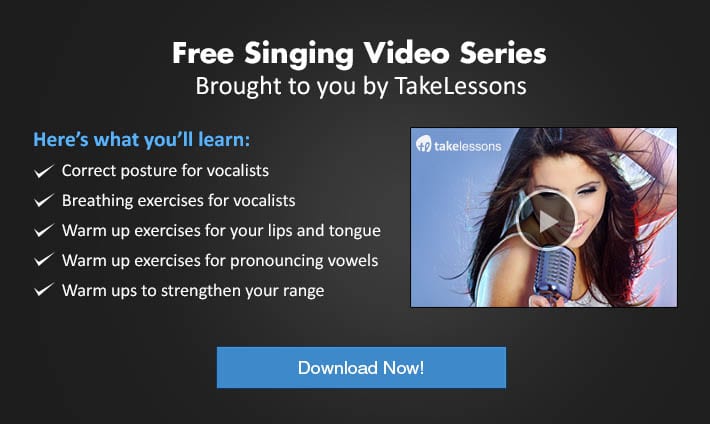What does it take to be a successful singer-songwriter? If you want to try your hand at writing your own tunes, you’ll want to read the following tips for how to be a singer-songwriter, shared by teacher Liz T...
So you’re a singer who’s always wanted to dabble with songwriting, but maybe you’re not quite sure where to start? Here are some pointers on how to kick off your songwriting career!
Getting Started With Songwriting
1. Find your inspiration
Look into your own life, your surroundings, and people that you look up to in order to find your muse for writing lyrics. Find a subject you are passionate about, whether it’s set to a love ballad or an uptempo dance song. Think about what kind of music really speaks to you, and what other listeners will relate to.
I encourage you to listen to other artists and different genres of music, but stay true to yourself and be original! Never copy another singer-songwriter’s style or lyrics.
2. Write everything down
Once you have found your inspiration, keep some sort of journal. You never know when lyrics may come to you — you could be on the subway, at a park, or in school, and you don’t want to forget what comes to you!
Also, I suggest having some type of recording software to record what comes to you, such as with the voice memos on your cell phone, or with GarageBand on your computer. If you keep singing a chorus or melody line over and over your head, record it as soon as you can so you don’t lose it!
3. Shape your song
Now it’s time to start crafting your song! Most successful songs have 2-3 verses and 2-3 choruses. Anything less or more than that may be a challenge.
Make sure there is a story in your song, and that you have some sort of point coming across. What do you want people to feel and think when they hear your songs? While there is no absolute right way to write a song, many people start out with writing meaningful lyrics, and then putting chords or melody to the words. Or you can do it the other way around, writing a beautiful melody and chord progression, and coming up with the lyrics last. Either of these approaches is acceptable.
Refining Your Songwriting

4. Test your songs out live
So, you think you have your song completed and ready to put out there? I suggest performing your song live — at an open mic or a talent show — to get all the kinks out, and to see how an audience reacts to it. Or you may want to start out simple by playing it for your friends and family, since performing original material in front of a live audience can be nerve-wracking!
5. Try recording your song
After you’ve been performing the song for a few months, it’s time to record your song! First, decide if you want to book a session in a recording studio or take a stab at recording in a home studio with the equipment you have. With technology today, it’s easy to record your own songs with the right computer software and a quality microphone.
Having a recording of your song, even if it is just a demo, will open many doors, especially if you want to become a singer-songwriter for your career. You can publish your song on YouTube, iTunes, or Soundcloud so potential fans, other artists, and established people in the music business can have access to your songs.
Establishing Your Songwriting Career
6. Collaborate with others
It’s fun to collaborate and write with other musicians! Sometimes writing lyrics may be your strongest skill, while it may be a weak point for someone else who is better at writing the instrumental part. Many famous singers collaborate in this way, including Elton John and Bernie Taupin, Andrew Lloyd Webber and Tim Rice, and Ashford & Simpson.
By collaborating with others, you may find someone that truly understands your music perspective and where you want to take your music, which can be an important asset for you in your career as a singer-songwriter. Of course, make sure you discuss splitting any profits 50/50 or come to an agreement in writing if you plan to distribute your music professionally.
7. Copyright your music
Getting a copyright for your music is crucial as a songwriter, and should not be overlooked! I recommend registering your song as soon as you have the final version of it written and recorded. You can do so easily online here at the U.S Copyright Office.
For a small fee you can register any songs that you have written, by submitting lyrics and a recording of your work of art (can be a demo). Once you have paid the fee and submitted your original materials, you then own the copyright to your song, and no one can use it without your permission. If you don’t register your works with the U.S Copyright Office, someone could steal your lyrics or your melody line, and make a whole new recording without your permission or having to pay you any royalties.
8. Look into Performing Rights Organizations
Once you have submitted your works to the U.S Copyright Office, I recommend joining a Performing Rights Organization (PRO). ASCAP, SESAC, and BMI are organizations that will collect any monetary royalties on your behalf and distribute them to you in a fair and organized way.
You may be earning royalties if you have songs on the radio, TV, YouTube, Spotify, or iTunes. Each time your song plays in a public place you are entitled to royalties. Some PROs are free to join while others have a joining fee, so do your research to see what’s best for you.
9. Consider writing for others
Being a songwriter doesn’t mean you have to write songs just for yourself. Some of the best singers in the world prefer to write songs for others. This could mean writing a song for the opposite gender, a song in a different language or a different genre, or a song that is too high or low for your vocal range. It’s perfectly normal to be a songwriter for other artists: Lady Gaga, Sia, and Bruno Mars all started out this way!
10. Pitch your music
Once you are confident in your original song, it’s time to pitch your music to the industry! This is not easy and won’t happen overnight, but with technology today, you do have an advantage of getting your music heard and seen by important music industry professionals.
One way is by submitting your music online to a music catalog. Many TV shows and commercial companies will look through these production libraries to find songs for their needs, and yours could be exactly what they are looking for! Do your research with these, as some have fees associated with signing up, while others are free. In major cities, there are also major networking events where artists can pitch their songs in person to companies like MTV and VH1 for a small fee. New York City’s “Spony” is a great opportunity for this.
Being a singer-songwriter myself (I’ve produced my own original songs and written jingles for companies), I hope that these strategies will help you create your songs and bring them to life for yourself and others to hear!
If you need help structuring your songs, or want even more advice on how to be a singer-songwriter, I’d love to work with you. Good luck!
 Post Author: Liz T.
Post Author: Liz T.Liz T. teaches singing, acting, and music lessons in Brooklyn, NY, as well as online. She is a graduate of the Berklee College of Music with a B.M in Vocal performance and currently performs/teaches all styles of music including Musical Theater, Classical, Jazz, Rock, Pop, R&B, and Country. Learn more about Liz here!
Photo by Fredrik Rubensson, Thomas Hawk, JanetandPhil
Suzy S.



